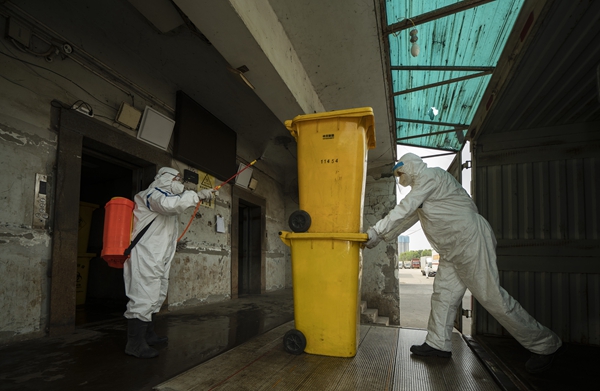Hospital cleaner's work helped defeat virus


Despite wearing a mask, He Xiaoling took several deep breaths upon stepping out of the hospital building. She had longed for fresh air free from the smell of disinfectant.
He, 55, is the head cleaner in the Fourth People's Hospital of Nanning City, a designated hospital for the treatment of the novel coronavirus disease (COVID-19) in the regional capital of South China's Guangxi Zhuang autonomous region.
She stayed in the hospital when she was assigned to the isolation ward section in mid-February.
In addition to the medics fighting on the front line, cleaners like He have risked their lives on duty in hospitals since the outbreak of the epidemic, disinfecting the wards and disposing of medical waste.
Initially in charge of disinfecting ambulances, He began to feel the tension on Jan 23. By then she had arranged the Lunar New Year holiday work schedule for the cleaners before going home.
"I had barely finished dinner when the hospital called me to return," she recalls.
On the same day, Wuhan, the former epicenter of the outbreak in Central China's Hubei province, was locked down with all public transport suspended, an unprecedented move to contain the pandemic.
Instructed by the medics of the infection department, He put on a protective suit, an isolation gown, goggles, gloves and shoe covers before working.
"The ambulances kept flowing in, with lights shining and sirens ringing. I will never forget that night," she recalls.
She and her colleagues handled the protective gear and towels deserted by medics one batch after another until early next morning.
Realizing the seriousness of the situation, He scratched the holiday schedule and called upon her local colleagues, who had been home for the holiday, to return.
"To my surprise, except those who were stranded in closed-off villages, or had the elderly and children in the family to take care of, everybody returned," she says.
She says one of her colleagues had to sleep at the hospital dorm because his landlord would not allow him to go back for fear of being infected.
The cleaners took turns to be on duty at the isolation ward section, with each shift working for two weeks, followed by quarantine for another two weeks.
Some of them were scared. "What if I get infected there," He remembers being asked. She says it was understandable as people are always afraid of unknown things, like the virus.
Her own shift at the section started on Feb 19.
At 5:25 am, she got up at the resting zone of the section. After a simple rinse, she disinfected the doctors' on-duty offices, nurse stations, elevators and stairways.
At 7:30 am, she started putting on protective gear before entering the wards, the toughest part of the day.
In the wards, she had to thoroughly disinfect the treatment trolleys, apparatus, the floor, the toilets and special passageways with disinfectant spray, ultraviolet radiation and antiseptic wipes.
Before leaving the section, she had to take off the different layers of her protective suits in different rooms before taking a shower. Each step had to be followed by meticulous hand washing. The whole process took at least half an hour.
"Every time I took off the protective gear, my clothes and hair would be soaked with sweat," she says.
Unlike ordinary medical waste that is packed and transferred to the garbage room before being collected by trucks, the waste from the isolation wards needed to be contained in paper boxes, entirely sealed, put into dumpsters and disinfected before being carried out. The waste would be directly carried away by vehicles from professional handlers. Used protective suits had to be disinfected as well.
According to the Ministry of Ecology and Environment, China has disposed of 182,000 metric tons of medical waste since late January during the fight against the epidemic.
As of March 21, China's medical waste disposal capacity had reached 6,066.8 tons per day, up from 4,902.8 tons before the epidemic outbreak, the MEE said in a statement.
On the very day He started her shift in the isolation wards, five people were cured and discharged from the hospital, so she got a nickname-"the lucky woman".
In early March, when the last patient was cured and walked out of the isolation ward, He finally ended her shift and started a 14-day quarantine.
Among the 254 confirmed COVID-19 cases in Guangxi, only two were still being treated in hospital, both of whom were imported cases, the regional health commission said on Wednesday.
"Now that the spring has come, I am desperate to have an outing with my family, without wearing a mask," she says.




































